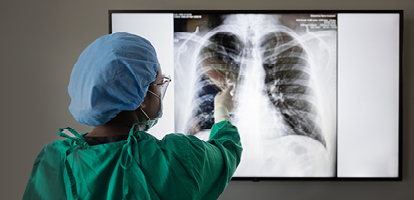Kaposi sarcoma is a skin cancer linked to herpesvirus. It’s a serious condition, but with early diagnosis and treatment, it can often be managed effectively.

What is Kaposi sarcoma?
Kaposi sarcoma (KS) is a type of cancer. It develops in the lining of blood vessels and typically appears as purplish-brown lesions on the skin, but, in some cases, it can also affect internal organs.
This type of skin cancer is often linked with HIV and AIDs. With new treatments for these diseases, this type of cancer has become less common in the United States. According to the American Cancer Society, there are about six cases per million people annually.
If you are facing a Kaposi sarcoma diagnosis, your AHN care team is here to help find the treatment you need.
Skin Cancer Center of Excellence
The AHN Skin Cancer Center of Excellence is at the forefront of delivering state-of-the-art treatment for skin cancer and melanoma. No other skin cancer center in the area has the technology, care, and compassion that AHN provides to its patients.
Why choose AHN for Kaposi sarcoma treatment?
At the AHN Cancer Institute, you’re never alone. Our comprehensive treatment, skilled health care professionals, and vast network of resources will help as you go through your personalized care plan. At AHN, you will find treatment that is:
- Personalized: Our skilled team of dermatologists, oncologists, pathologists, and surgeons work together to offer the latest targeted, minimally invasive surgeries or therapies pinpointed to the type of Kaposi sarcoma you have.
- Patient-centric: Our Navigation Team helps coordinate appointments, answers questions about symptoms and treatment options, and provides logistical support if you need to travel. We remove the burden that can come from organizing care at multiple locations.
- Compassionate: Cancer treatment is a stressful time. AHN wants to help alleviate that stress. Our compassionate team of caregivers is devoted to improving your quality of life, helping you understand treatment options, and keeping you comfortable every step of the way. Our robust support services are centered around you living your best quality of life during treatment.
- Collaborative: We believe in a team approach. Whether it’s surgery, chemotherapy, medical oncology, or radiation therapy, everyone is working together to treat you and your specific diagnosis.
Kaposi sarcoma symptoms and signs
Kaposi sarcoma (KS) symptoms can show up in a variety of ways, depending on the type and location of the skin lesions. Early stages of KS may only involve a few small lesions that are easily treated. Advanced KS can be life-threatening, especially in people with weakened immune systems. The symptoms and signs of KS can vary greatly from person to person, so it’s important you have a doctor you are seeing for regular screenings and checking your skin for new or different changes.
KS lesions on the skin can be flat or raised, and may appear as patches, plaques, or nodules. The lesions will be purplish-brown, red, or dark brown in color. They are commonly found on the legs, feet, face, and mouth. However, they can appear anywhere on the body, including the torso, arms, and genitals.
There are other symptoms to be on the lookout for with KS. Those include:
- Swollen lymph nodes.
- Coughing, shortness of breath, or chest pain.
- Abdominal pain, nausea, or vomiting.
- Weight loss or fatigue.
If you are experiencing any of those symptoms, contact your doctor right away.
In severe cases of Kaposi sarcoma (KS), it can begin or spread to your organs. If you notice any of the following symptoms or signs, talk with your doctor so you can start the appropriate treatment plan.
- Lungs: KS in the lungs can cause coughing, shortness of breath, and chest pain.
- Lymph nodes: Swollen lymph nodes can occur in the neck, armpits, or groin.
- Digestive tract: KS in the digestive tract can cause abdominal pain, nausea, vomiting, and difficulty swallowing.
- Other organs: KS can also affect the liver, spleen, and brain, leading to a variety of symptoms depending on the affected organ.
Kaposi sarcoma risk factors
Unlike other, more common skin cancers, Kaposi sarcoma (KS) is caused by a virus — a strain of the herpesvirus called HHVB. It is not the same herpes virus that causes cold sores or genital herpes. KS can affect anyone. However, there are risk factors that make certain people more susceptible to the disease. KS is more common in older adults and those who smoke. You are at higher risk for developing KS if you have a weakened immune system from HIV or AIDS, or if you are taking immunosuppressants after an organ transplant. Other conditions that weaken the immune system, such as certain cancers and malnutrition, can also increase the risk of KS.
Early detection and treatment are crucial. If you have any concerns about KS, it’s important to consult a doctor for proper diagnosis and management.
Human Herpesvirus 8 Infection
Human Herpesvirus 8 (HHV-8) Infection, also known as Kaposi sarcoma-associated herpesvirus (KSHV), is a virus that plays a crucial role in the development of Kaposi sarcoma (KS). HHV-8 is the primary cause of KS. It’s a common virus, but most infected individuals never develop KS. It is spread through bodily fluids, primarily through sexual contact, but also through blood transfusions, organ transplantation, and saliva. Individuals with multiple sexual partners, men who have sex with men, and people with HIV/AIDS are at higher risk of HHV-8 infection. Many people are infected with the virus, but never develop the disease.
It’s critical to have open and honest conversations with your doctor. They are here to listen, help, and treat. AHN offers thoughtful, compassionate care for all our patients. We see you as a person who has individual needs and experiences, and we take that into account when part of your care team.




Kaposi sarcoma screening and diagnosis
Your doctor will work with you to determine if you should be screened for Kaposi sarcoma (KS). If it is determined you should be screened, your doctor will review your medical history and perform a physical exam. Your medical history includes if you have any of the risk factors, including if you have or are at risk for HIV or AIDS, a weakened immune system, and if KS runs in your family. If anything is found from the screening, your doctor may want to order some of the following lab tests to get a full picture of your health.
Biopsy
A biopsy is done by removing a small amount of tissue from your skin. During a biopsy, we give you an anesthetic so you will be comfortable. That tissue sample is then examined under a microscope. A biopsy can determine if cancer is present. A definitive diagnosis of KS is typically made based on the results of a biopsy and the presence of characteristic lesions. There are two different types of biopsies that are performed when looking for the presence of KS:
- Histopathology: The biopsy will be analyzed for the presence of atypical cells characteristic of KS.
- Immunohistochemistry: This technique can identify HHV-8 proteins in the cells, confirming the diagnosis of KS.
Blood tests
Due to its relation to HIV and AIDS, it’s important to do blood work on those at high risk for Human Herpesvirus 8 (HHV-8) Infection. Knowing your medical history, your doctor will order the appropriate blood tests to screen for Kaposi sarcoma.
Your blood test may include an HHV-8 Antibody Test. This can detect antibodies to HHV-8, indicating past virus infection. However, it doesn't confirm the presence of KS. Given the high correlation of KS and HIV, a HIV Test will be performed to rule out HIV infection. This series of test will better help your doctor understand your risk factor for developing Kaposi sarcoma.
Imaging studies
If you have other symptoms of KS that your doctor believes you may be showing signs of KS internally, your internal organs will be checked. This could be done by:
- Chest X-ray: May be used to assess the lungs for signs of KS.
- CT Scan: Can provide detailed images of the lungs, lymph nodes, and other organs to detect KS lesions.
- MRI: May be used to evaluate the brain or other organs for KS.




Types and stages of Kaposi sarcoma
Kaposi sarcoma (KS) is classified into different types based on its characteristics, location, and progression.
Classic Kaposi sarcoma
Classic Kaposi sarcoma is slow growing, typically affecting older men of Mediterranean or Eastern European descent. It usually affects the skin, particularly the legs, feet, and face. Lesions may progress slowly over years, but rarely spread to internal organs.
Endemic Kaposi sarcoma
Endemic Kaposi sarcoma is more aggressive than classic KS. It typically occurs in young adults living in sub-Saharan Africa. It affects the skin, lymph nodes, and internal organs. It can progress rapidly and lead to significant morbidity and mortality.
AIDS-related Kaposi sarcoma
AIDS-related Kaposi sarcoma is the most common type of KS, associated with HIV infection. It can affect the skin, lymph nodes, internal organs, and mucous membranes. It can be highly aggressive and spread rapidly, particularly in individuals with advanced HIV infection.
Iatrogenic Kaposi sarcoma
Iatrogenic Kaposi sarcoma develops in individuals who have received organ transplants and are taking immunosuppressant medications. It can affect the skin, lymph nodes, and internal organs. It can be aggressive, but often responds well to treatment.
Stages of Kaposi sarcoma
The staging of KS is based on the extent of the disease and its impact on the body. The most widely used staging system is the Ann Arbor staging system:
- Stage I: Limited disease, with lesions confined to a single area of the skin or a single lymph node.
- Stage II: Multiple skin lesions or involvement of multiple lymph nodes, but no visceral involvement (affecting internal organs).
- Stage III: Visceral involvement, such as lesions in the lungs, digestive tract, or other organs.
- Stage IV: Widespread disease, with multiple lesions and visceral involvement, often accompanied by significant symptoms and complications.




Kaposi sarcoma treatment
Based on your specific diagnosis, medical history, and your overall health, your dermatologist will recommend the best treatment option. It’s important to discuss the risks and benefits of each treatment option with your doctor. Depending on what you and your doctor discuss, your treatment may include:
- Chemotherapy: These are specialized drugs that kill off cancer cells.
- Radiation therapy: Using targeted, high-energy rays against cancer cells, allowing healthy cells to remain.
- Immunotherapy: This works with your body’s own immune system to fight off the cancer.
- Surgery: Depending on the type of lesion, surgery could be an option to remove it and improve any discomfort or risk of it impacting other bodily function.
Kaposi sarcoma FAQS
A Kaposi sarcoma is diagnosis will likely lead to questions and maybe concerns. Your AHN care team is here to help you feel more confident in your treatment plan and will be with you to help answer questions. To get you started, we’ve compiled frequently asked questions our patients often have about Kaposi sarcoma, so you can get the background information you might need to have productive conversations with your care team.
Can you recover from Kaposi sarcoma?
Recovery from Kaposi sarcoma (KS) is possible, particularly when it's linked to a treatable underlying condition like HIV/AIDS. In many cases, effective treatment of the underlying immune suppression (e.g., with antiretroviral therapy for HIV) can lead to the regression and control of KS lesions. While the lesions may not entirely disappear, the disease can be managed, and patients can live long, healthy lives. Complete eradication of the virus causing KS (HHV-8) from the body is rare, so lifelong monitoring is often necessary.
Do Kaposi sarcoma lesions go away?
Kaposi sarcoma lesions can sometimes go away or significantly shrink, especially with effective treatment. For instance, in individuals with HIV-associated KS, antiretroviral therapy (ART) can often cause the lesions to regress or disappear by restoring immune function. Other treatments like chemotherapy, radiation, or topical therapies can also reduce the size and number of lesions. However, even when lesions go away, there's always a risk of them reappearing, necessitating ongoing medical surveillance.
Can Kaposi sarcoma go away?
Yes, Kaposi sarcoma can go away, or at least go into remission, especially when the underlying cause (such as severe immune suppression) is addressed. For example, if KS develops in an organ transplant recipient due to immunosuppressive drugs, reducing these drugs can sometimes lead to KS regression. Similarly, in AIDS-associated KS, highly active antiretroviral therapy (HAART) has dramatically reduced the incidence and severity of KS, often causing lesions to disappear or remain stable.
Is Kaposi sarcoma fatal?
While Kaposi sarcoma can be fatal, especially in its more aggressive forms or when it affects internal organs (such as the lungs or gastrointestinal tract), it is often not directly life-threatening, particularly in its cutaneous form. The fatality risk is higher in individuals with severely compromised immune systems or those who cannot receive effective treatment for the underlying cause (like untreated HIV). With modern treatments, many individuals with KS can live with the condition for many years, often dying from other causes unrelated to KS itself.
What is Kaposi sarcoma caused by?
Kaposi sarcoma is caused by infection with the Kaposi Sarcoma-associated Herpesvirus (KSHV), also known as Human Herpesvirus 8 (HHV-8). However, not everyone infected with HHV-8 develops KS. The development of KS typically requires a co-factor, most commonly a weakened immune system. This is why it is frequently seen in:
- HIV/AIDS patients: The most common form, due to severe immune suppression.
- Organ transplant recipients: Who take immunosuppressive medications.
- Elderly men of Mediterranean or Eastern European descent: Known as classic KS, often less aggressive.
- Young men in equatorial Africa: Known as endemic KS.
Contact us
Call the Hope Line at 412-578-HOPE 412-578-4673 to connect with a nurse navigator or schedule an appointment.
Book a screening
Screenings let us find cancer early when it’s most treatable. Schedule a skin cancer screening near you during a weekday or during a Saturday screening time.
Second opinions
If you have cancer, you have a team of oncology specialists ready to review your medical records and offer you a second opinion. After completing their review, they’ll talk with you about your goals to determine a course of treatment that’s right for you. To get started, fill out our Second Opinion Request form. A nurse navigator will contact you within the next 24 to 48 hours to discuss next steps and schedule.

